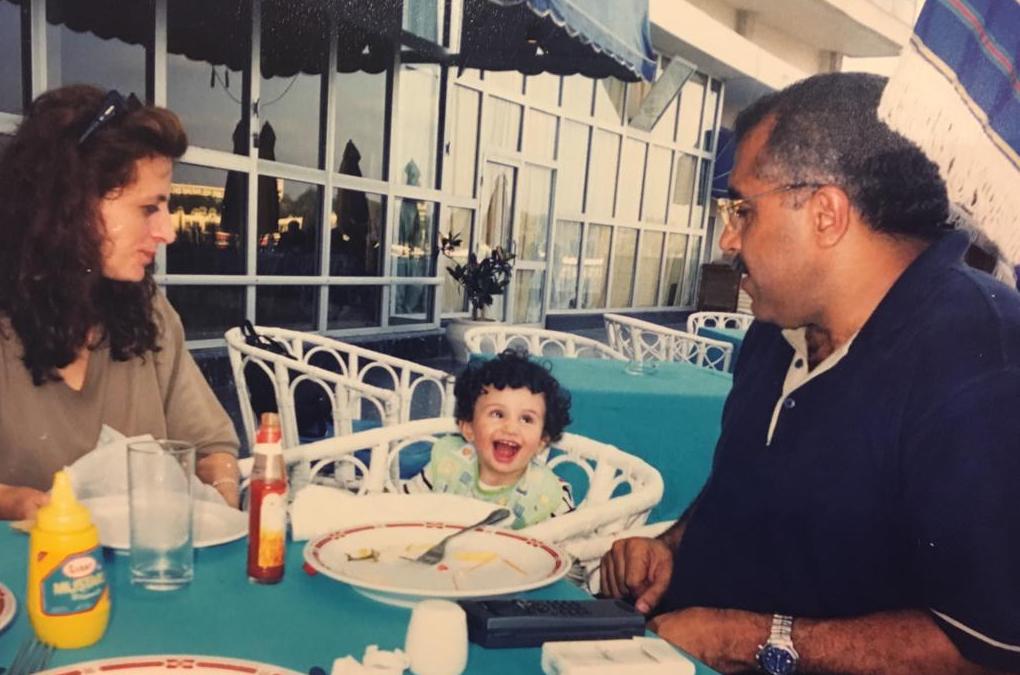I love my big, crooked nose, but that hasn’t always been the case. The first time I was made aware of its size was when my aunt asked me if I had broken it. Her sentiment made me feel sick. I pushed aside my childhood ambitions of becoming a writer or journalist, and instead set my sights on the ultimate achievement: A nose job. As I grew older, I fell into a chasm of self-loathing. My white-passing, thin, green-eyed mother was always my model of a perfect person, and I was her opposite. My dad and I share the same big noses, big lips, brown eyes, and thick, dark hair. My mom was always reflected in mainstream media, while my father and I were sidelined.
I remember early mornings sitting at the breakfast table, my mother struggling to comb and style my frizzy hair before school in a futile attempt to try and get it to match hers. Throughout elementary school, I would draw myself with long, straight, blonde hair and green eyes—I also remember my teachers’ confused looks when I handed in my questionable portraits. I remember when kids in my high school class would try to hide pencils in my thick hair to see if I’d notice, or ask to touch it and see if it was real. I remember pinching at my stretch marks in front of the mirror, using heaping amounts of SunIn with no effect, and learning how to use Photoshop just so I could see what my nose would look like after surgery. As soon as I was old enough to take care of myself, I stopped. I suffered from an eating disorder throughout high school, I bleached and destroyed my once fluffy curls, and I wore Spanx every time I left the house—my mom bought me my first pair.
My insecurity was not just a product of vanity, but also a safety concern. Visibly Egyptian, I was never able to escape long security checks at airports, racist cat-calls, and targeted bullying, fellow students would call me an ‘ugly Egyptian,’ amongst other slurs. Even during my time at McGill, I am constantly racially fetishized. In my first year, I was followed home at night by a man who was yelling slurs at me. This wasn’t the first, nor the last time, but, now, every time I walk on St. Catherine street, I hold my breath.
No matter where I went in the world, my appearance was a point of contention. Even in Egypt, Eurocentric colonial standards of beauty still persist, as British colonialism only officially ended in 1956—the year my dad was born. The streets are littered with billboards for Fair & Lovely, a skin lightener, and hair relaxers that my cousins would recommend to me.
Eventually, I became frustrated with constant physical self-awareness. I looked for strong Egyptian role models who looked like me, such as Mona Eltahawy and Nawal El-Saadawi: Two intersectional-feminist writers. I learned about my heritage, albeit sometimes through Wikipedia. Therapy also helped. As I began to discover more about my rich ancestry, I began to decolonize my beauty standards, and I started to love myself.
I have the crooked nose of my ancestors; I carry my history in every one of my facial features. I am now glad to be my father’s lookalike. I have come to recognize that I am like my mom in a lot of ways, too—we both have the same deafening laugh, fiery courage, and ability to bulldoze every barrier in our way. My nose is huge, as are my lips and brown eyes—and I love them.










Love this. Don’t be ashamed of your heritage